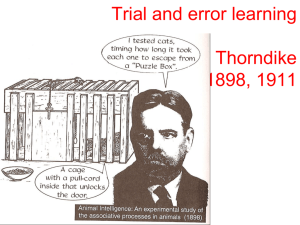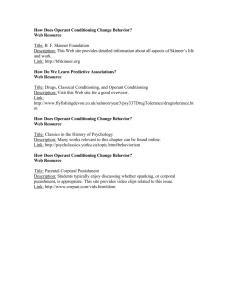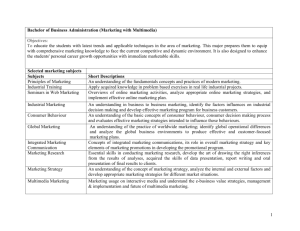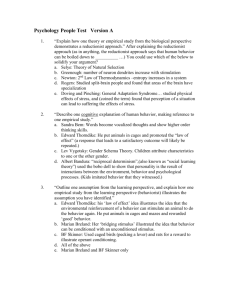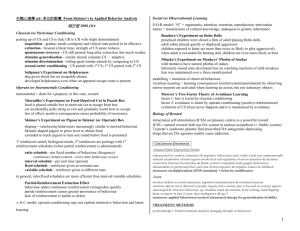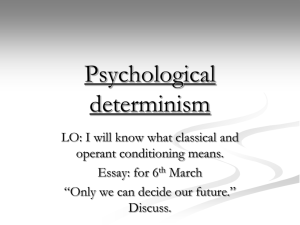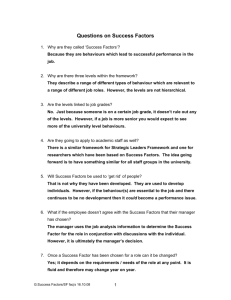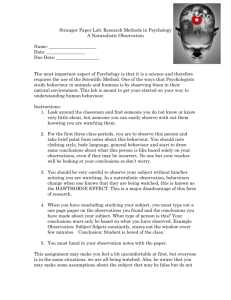4. Operant Conditioning- Psychology
advertisement
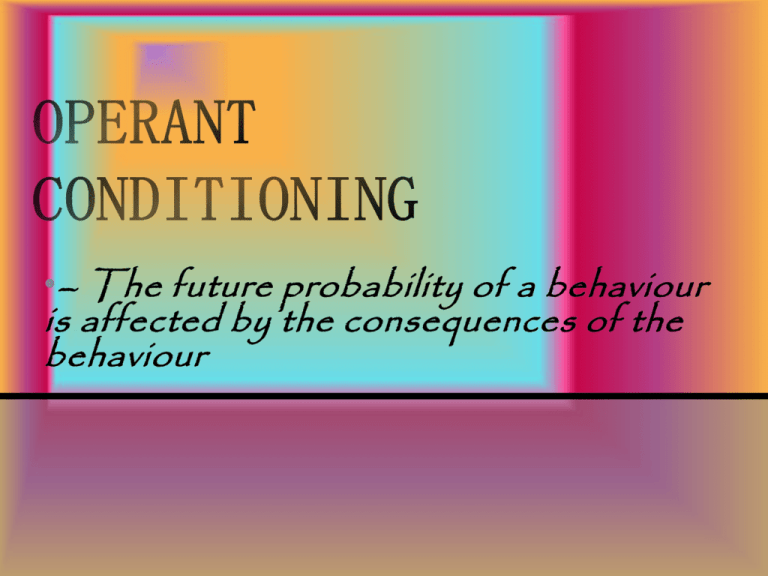
•– The future probability of a behaviour is affected by the consequences of the behaviour Historical Background • Edwin L. Thorndike, 1898 – Interest in animal intelligence – Believed in systematic investigation – Formulated the Law of Effect: • Behaviours that lead to a satisfactory state of affairs are strengthened or “stamped in” • Behaviours that lead to an unsatisfactory or annoying state of affairs are weakened or “stamped out” Thorndike’s Puzzle Box Experiment Placed a hungry cat in a puzzle-box (cage) and a small amount of food was placed just outside the door • To get to the food, the cat could open the door by pressing a lever • Initially, the cats tried a number of behaviours to escape before stumbling across correct response • Thorndike was interested in how long it took the cat to escape when placed back in the box Results Trial 1 - more than 150 seconds to escape Trial 40 = 7 seconds • Behaviours that opened the door were followed by consequences (escape, food) • Operant conditioning – the organism’s behaviour changed because of the consequences that followed it Thorndike’s Puzzle Box Conclusions • Thorndike argued that the behaviour was not insight or intelligent, because the cats would have escaped from the cage immediately on every trial after discovering the “solution” – What he observed was a steady decline in the frequency of behaviours other than the “correct” one – Even showing the cat what to do did not affect escape latency Thorndike’s Law of Effect • Thorndike reasoned the response that opened the door was gradually strengthened, whereas responses that did not open the door were gradually weakened • He suspected that similar processes governed all learning • Law of effect: – Behaviours leading to a desired state of affairs are strengthened, whereas those leading to an unsatisfactory state of affairs are weakened YouTube - Thorndike - Law of Effect Skinner • Skinner systematized operant conditioning research using the Skinner Box • He devised methods that allowed the animal to repeat the operant response many times in the conditioning situation • Studied lever pressing in rats & pecking in pigeons • Skinner believed behaviour could be classified into two subcategories 1. Respondent behaviour 2. Operant behaviour • Proposed that voluntary behaviours are controlled by their consequences (rather than by preceding stimuli) Operant Behaviour – The consequences that follow a certain response, affect the future probability (or strength) of the response: Press Lever ® Food Press Lever ® Shock – Operant behaviours are elicited by the organism (voluntary) YouTube - Operant conditioning Reinforcers & Punishers • Operant Consequences: Reinforcers & Punishers FILL IN THE FOLLOWING: • For an event to be a reinforcer, it must 1. 2. • For an event to be a punisher, it must 1. 2. •Complete ‘Check your understanding 9.4’ from your text •YouTube - ?????
